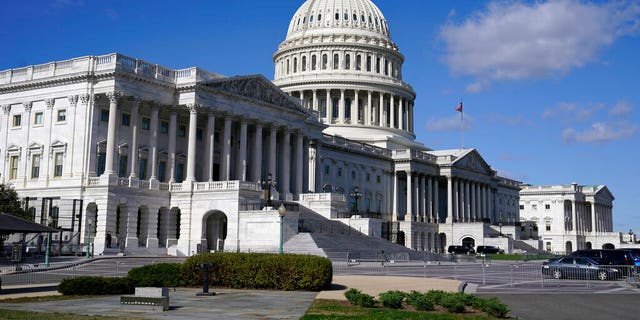Legislation to help first responders and educators buy homes has rare bipartisan support
The HELPER Act is a bipartisan legislation bill and home loan assistance program backed by Republican Sen. Marco Rubio of Florida and Democratic Sen. Jon Ossoff to allow law enforcement, firefighters, EMS and educators of grades K-12 to purchase homes in the communities they serve.
The HELPER Act, or Homes for Every Local Protector, Educator, and Responder, would provide civil servants a one-time-use home loan at a 3.6% premium fee to the federal government without requiring a down payment. This fee populates an insurance fund that houses money in case of foreclosure from a recipient of the loan.
“That kitty right now, I think, is 300% overfunded,” said Samuel P. Royer, Marine veteran and National Director of Heroes First Home Loans. “There is enough money in that kitty so if somebody goes into foreclosure, there’s going to be enough money to cover it where no real tax money is going to be paid.”
MARCO RUBIO SAYS BILL AIDING POLICE HOMEOWNERSHIP WILL ‘HELP THE PEOPLE WHO HELP US’
The four groups of civil servants this legislation would assist cannot currently afford to buy homes in some communities where they serve. The goal is to provide first responders and educators the same home loan benefits the VA offers, including no down payment mortgages.
The Good Neighbor Next Door HUD program defines all four groups including law enforcement, firefighters, EMS, and educators as beneficiaries of their sales program. The HUD homeowner program offers these individuals the opportunity to buy houses at a cheaper price if the homes have been foreclosed on. While the program is a chance for lower-income civil servants to become homebuyers, there are not enough homes going into foreclosure for the lot of employees looking to buy.

“There are only 14 homes available for every firefighter, police officer, EMS, paramedic and teacher to buy at a cheaper price in the state of Ohio,” said George McElwee, Navy veteran and co-founder and managing partner of Commonwealth Strategic Partners based in Washington, D.C. “That’s all that’s available.”
The low inventory is where The HELPER Act would help. The legislation would provide a second source of affordable homeownership for those first responders and educators working in communities across America.
The bipartisan legislation is also meant to assist recruiting new first responders and educators. The U.S. is experiencing a teacher shortage, and school districts are struggling to fill positions with less than a month before the school year begins. According to the NEA, 55% of educators planned to leave their profession at the start of 2022. This is a substantial increase from the 37% just a few months prior in August 2021.
According to the New York Times, in 2020, 2,600 police officers retired in NYC alone. Due to aggressive protesting and brutality toward police officers in just the last few years, departments are facing difficulty commissioning new police officers and retaining current ones.
HOUSE BILL WOULD ALLOW TEACHERS, FIRST RESPONDERS TO NO DOWN PAYMENT MORTGAGE
Violent crimes are on the rise, especially in Baltimore, Los Angeles, Philadelphia, Washington D.C., Atlanta, and New York City. The HELPER Act is an incentive for current first responders and educators to maintain their roles and for prospective personnel to join workforces in their communities.
Why hasn’t The HELPER Act been passed?
The House bill, H.R. 3172 and Senate bill S. 2981, is currently backed by 77 out of 435 House and Senate sponsors and co-sponsors. The support comes from both Democrats and Republicans in Congress.
“It doesn’t seem like a big number, but it’s actually a pretty stout number,” Royer said. Sheriffs, state troopers, and mayors across the country and over 200 organizations are supporting the bill. Notably, the Fraternal order of Police (FOP), International Association of Fire Fighters (IAFF), National Education Association (NEA) and EMT International are also in support of the legislation.
“All four groups saying ‘we agree’ is not common in Washington,” said Royer.

“I’m 100% saying I’m going to get this done,” said McElwee. “When we get those numbers, that’s when we can start pushing it to House Financial Service Committee Chairwoman Maxine Waters and Senate Banking Committee Chairman Sherrod Brown.”
The bill has yet to hit the committee and House and Senate floors. “There has been an education process for who will benefit from the legislation,” said McElwee. “We have met some resistance when it comes to teachers.”
The bill states, “To amend the National Housing Act to establish a mortgage insurance program for first responders, and for other purposes,” but educators are included as eligible mortgagors.
Sen. Pat Toomey., R-Pa., is not yet on board and questioned how much mortgage the bill could end up subsidizing.
“Senator Toomey has not taken a position on the HELPER Act as it has yet to come before the Committee for consideration,” said a spokesperson for Senator Pat Toomey. “There are already many federal programs that give taxpayer-subsidized mortgages to veterans and other Americans. If Congress decides to extend these taxpayer benefits to teachers and first responders, should it also give them to other medical professionals like nurses or nursing home aides? What about preschool teachers, prosecutors or public defenders, or other law enforcement officials? Should taxpayers subsidize mortgages for all public sector employees, or are some more worthy than others? The bill sponsors need to explain to the taxpayers where the line should be drawn.”
Backers of The HELPER Act say teachers are first responders as well as civil servants.
“We know that every day there are threats on our schools, and the ones that have stepped in the way to safeguard our children are the teachers,” said Royer.
Most recently, two teachers, Eva Mireles and Irma Garcia, lost their lives protecting students from a school shooter at Robb Elementary School in Uvalde, Texas.
Read the full article Here


